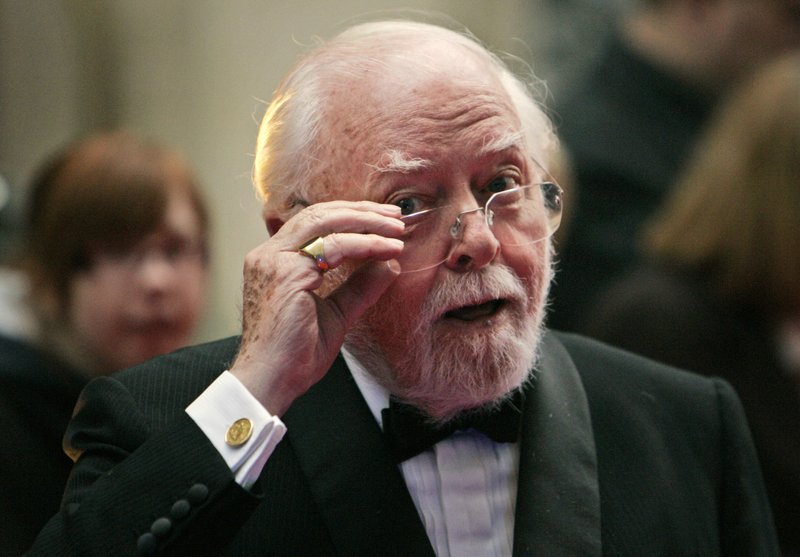Correction: The film How Green Was My Valley won an Oscar for Best Picture in 1942. This obituary misstated which film received the award.
LONDON -- Acclaimed actor and Oscar-winning director Richard Attenborough, whose film career on both sides of the camera spanned 60 years, has died. He was 90.
The actor's son, Michael Attenborough, told the BBC that his father died Sunday. He had been in poor health for some time.
British Prime Minister David Cameron issued a statement calling Attenborough "one of the greats of cinema."
Ben Kingsley, who shot to global fame for his performance as Mahatma Gandhi, recalled Attenborough's passionate 20-year struggle to bring Gandhi's story to the big screen. The film won eight Oscars, including best picture, best director for Attenborough and best actor for Kingsley.
"He placed in me an absolute trust, and, in turn, I placed an absolute trust in him and grew to love him," said Kingsley. "I, along with millions of others whom he touched through his life and work, will miss him dearly."
With his snow-white hair and beard, Attenborough was one of the most familiar faces on the British arts scene -- universally known as "Dickie."
He appeared in many major Hollywood films, directed a series of movies and was known for his extensive work as a goodwill ambassador for UNICEF and other humanitarian causes.
Attenborough directed several successful movies, including Oh What a Lovely War in 1969 and Chaplin and Shadowlands in the 1990s.
As an actor, Attenborough was introduced to a younger generation in the 1990s when he played the failed theme park developer in Jurassic Park and Kriss Kringle in a remake of Miracle on 34th Street.
A small, energetic man with a round face that remained boyish even in old age, he was perfectly cast at the start of his career as the young sailor or airman of British movies both during and after World War II.
In his 1942 film debut as a terrified warship's crewman in In Which We Serve, a 19-year-old Attenborough made a small part into one of the most memorable roles in the movie, which won the Best Picture Oscar.
In 1947, Attenborough gave one of the best performances of his career as the teenage thug Pinkie in Brighton Rock, the film version of Graham Greene's novel.
He appeared as a prisoner of war in 1963's The Great Escape -- known for its classic ensemble cast, including Steve McQueen, James Coburn and Charles Bronson -- and starred in Guns at Batasi, for which he won another British Film Academy award. In 1967, he won a Golden Globe for Best Supporting Actor in The Sand Pebbles.
By the mid-1970s, Attenborough had become a director who only occasionally acted. It was said that he took acting jobs to help finance the movies he wanted to direct.
Attenborough was often thought to be at his best when trying to coax the finest work from actors. Gandhi made a star of its little-known leading man, Kingsley, and Denzel Washington won an Oscar nomination for the 1987 film Cry Freedom.
Debra Winger was nominated for an Oscar, and Anthony Hopkins gave one of his best performances in Shadowlands, a film that won Attenborough perhaps his greatest critical praise.
Attenborough, the son of a university principal, was born Aug. 29, 1923, into a family with strong liberal views and a tradition of volunteer work for humanitarian concerns.
One of his younger brothers is naturalist David Attenborough, whose nature documentaries have reached audiences around the world.
Richard Attenborough was a tireless defender of the British film industry. His artistic and humanitarian efforts were rewarded with several international prizes, including the Martin Luther King Jr. Peace Prize in 1983.
He was knighted in 1976, and 17 years later received a life peerage, becoming Baron Attenborough of Richmond upon Thames.
Information for this article was contributed by Jill Lawless and Jake Coyle of The Associated Press.
A Section on 08/25/2014

